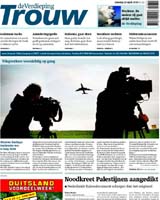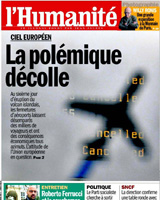
But there should be something more. These events should make us ponder about the very nature of how we have organised the way we live now. Europe will eventually be back in business but it will not, I feel, be business as usual. Or at least it ought not to be, for once the airlines have struggled back to their usual service we should try and learn how to run the rest of our economy, and indeed our society, more wisely.


European Union
No-fly ban empties EU institutions
"Empty seats are not uncommon in Brussels, but the closure of EU airspace has resulted in an unprecedented level of absences, and the cancellation of numerous meetings," reports Le Soir, which publishes a list of European meetings that have been cut short, cancelled or postponed. The meeting of European agriculture ministers in Luxembourg initially scheduled for Monday 19 April has been postponed indefinitely. Last weekend's meeting of EU finance ministers in Madrid went ahead, but there was a dramatic reduction in the number of participants on Saturday, which was directly attributable to "ministers' eagerness to return home as soon as possible." The Brussels daily also has a few sympathetic words for "journalists covering the event who faced a 20-hour journey back to Brussels in a bus thoughtfully provided by the Spanish Presidency of the EU."
Writing in his blog Coulisses de Bruxelles, Jean Quatremer reports that the decision not to call off a plenary session of the European Parliament scheduled for 19 April enraged MEPs who are none too pleased with Parliament President Jerzy Buzek. Buzek who was in Poland to attend the funeral of Lech Kaczyński "was unable to decide on the cancelation of the plenary session," which appeared to be "in jeopardy." A little more than one hundred of Europe's 736 MEPs actually turned up, notes Quatremer, while most of their colleagues who were grounded by the air traffic blackout remained at home. "In view of this monumental glitch," the session has been cut short and will end on Wednesday instead of Thursday. In the absence of a quorum, all the votes have been postponed. On Tuesday morning, MEPs will discuss the consequences of the ash cloud. "A quick glance at the empty seats in the parliament might lead to some very pertinent observations," remarks Quatremer, who wonders: "Just for a laugh, would Parliament be willing to inform Europe's taxpayers on the cost of this session for nothing?"











